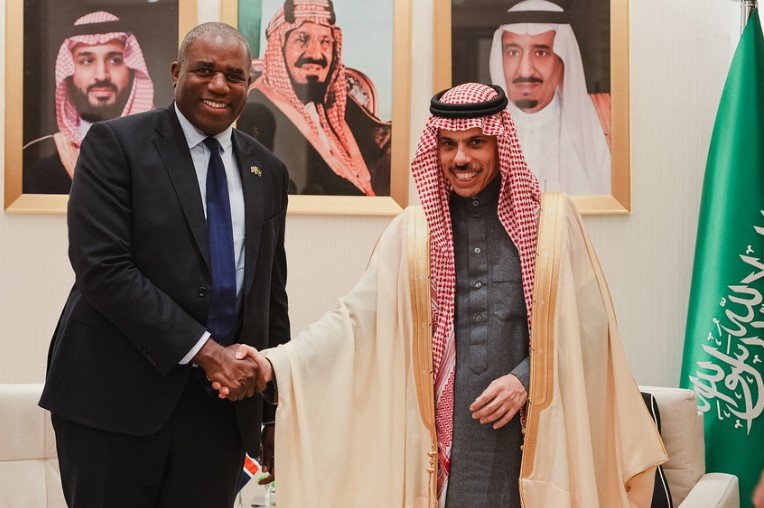Two top diplomats from Riyadh and London spoke on Sunday as worries grow over rising instability in the region. And while official words remained diplomatic, the timing and context said plenty.
It wasn’t just another check-in between allies. The call between Saudi Foreign Minister Prince Faisal bin Farhan and UK Foreign Secretary David Lammy comes as Middle East flashpoints keep shifting—and fast. Israel’s fragile ceasefire with Hezbollah, Houthi missile chatter, Syria’s sporadic flare-ups, and Tehran’s nuclear brinkmanship all paint a powder-keg picture.
The Saudis and Brits, it seems, are trying to keep the matchbox at bay.
A Relationship That’s Quietly Grown More Strategic
Saudi-UK ties have historically been a careful blend of commerce and diplomacy. Oil deals, defense cooperation, and arms sales often steal headlines, but behind the scenes, there’s been a growing sense that the two countries need each other in messier ways too.
In recent years, British diplomats have leaned more heavily on Riyadh to help navigate the political wreckage left behind in parts of Yemen, Sudan, and Syria.
At the same time, the Saudis have found in the UK a partner that’s willing to talk security but also listen when it comes to broader economic vision. Riyadh’s Vision 2030 blueprint—to move beyond oil and transform the Kingdom—has quietly gained British corporate and policy support.

Sunday’s call, described by the Saudi foreign ministry as one that “reviewed bilateral relations” and addressed “regional developments,” didn’t go into detail. But people familiar with Gulf diplomacy say it almost certainly included:
-
Efforts to keep the Iran-Israel conflict from reigniting.
-
UK cooperation on maritime security near the Bab el-Mandeb Strait.
-
Concern over the humanitarian collapse in Gaza.
-
And possibly, chatter on Syria’s deteriorating border zones.
David Lammy Steps Into His Role With Gulf Focus
For David Lammy, this isn’t just another call. He’s still settling into the Foreign Office after Labour’s landslide win, and eyes are on him to chart a new foreign policy course after years of Conservative-led engagement.
Lammy’s approach to the Gulf appears pragmatic. Less bluster, more listening. His team, according to sources in Whitehall, is focused on rebalancing relationships post-Brexit and repositioning the UK as a steady hand in shaky regions.
Saudi Arabia fits neatly into that strategy—not just because of energy clout, but because of its influence on other Arab states, its ties to Egypt, and its backchannels with Iran and Israel.
Interestingly, Lammy’s first major diplomatic test came during the tail-end of the June conflict between Iran and Israel, when he publicly called for restraint from all sides and supported US efforts to broker a ceasefire.
This call with Prince Faisal could hint at what kind of Middle East player the UK wants to be under Labour.
Growing Pressure on Gulf States to Act as Stabilizers
With Washington partially distracted by its election season and Europe consumed by internal politics, there’s a quiet vacuum developing in Middle Eastern diplomacy. Saudi Arabia, increasingly, is expected to step up.
But it’s not that simple.
While Riyadh has earned plaudits for recent de-escalation with Tehran and its efforts to cool the Yemen conflict, it still walks a tightrope. Domestically, it wants stability to fuel investment. Regionally, it’s caught between alliances and rivalries.
The UK, meanwhile, sees Saudi Arabia as a sort of pressure valve. Not perfect, but pivotal.
Table: Key Regional Flashpoints Likely Discussed by Saudi-UK Diplomats
| Issue | Saudi Role | UK Interest |
|---|---|---|
| Iran-Israel Tensions | Broker, Influencer via OIC | NATO ally, arms supplier to Israel |
| Red Sea Maritime Security | Anti-Houthi operations | Protect shipping lanes |
| Gaza Humanitarian Crisis | Financial aid, Arab consensus | International law, UN partner |
| Syria-Jordan Border Instability | Border coordination, refugee flow | European migration policy impact |
Even with strong ties, both sides tread carefully—especially as public opinion back home can turn quickly when war or human rights are involved.
Backchanneling, Business, and Balancing Acts
The call wasn’t just about politics. With so much riding on commercial ties and investment flows, especially in defense and infrastructure, business was very likely on the table too.
Britain still exports billions in military equipment to Gulf states. It also wants to tap into opportunities in NEOM, the Saudi futuristic megacity project, and other Vision 2030 initiatives.
And while Saudi Arabia’s Public Investment Fund (PIF) is splashing cash around the globe—from sports to AI—the UK is trying to stay attractive to that flow of capital.
There’s also oil, always oil. Though neither side openly discussed it, crude market dynamics remain a core concern for both countries. The UK’s inflationary pressures and the Saudis’ tightrope walk on OPEC+ cuts add another layer to the relationship.
At least one paragraph in that call might’ve gone like this: “Let’s keep the prices steady—for everyone’s sanity.”
Quiet Diplomacy in a Noisy World
For now, both foreign ministers are playing things cool. There are no joint statements, no flashy photos, no dramatic announcements. Just a short note from Riyadh and silence from Whitehall.
And that’s how both sides probably prefer it.
Because these days, the most important work in foreign policy isn’t happening on podiums or Twitter—it’s on quiet phone lines, behind closed doors, as diplomats try to keep crises from spilling over.
Especially when the matches are already out—and the powder is dry.
